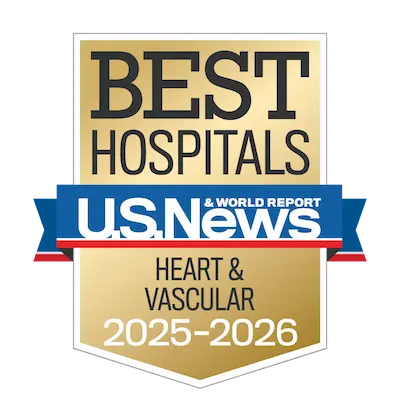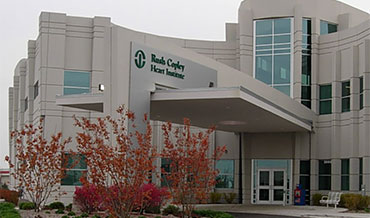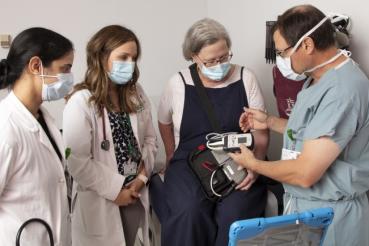Heart failure happens when the heart muscle weakens or stiffens and can’t pump enough blood to meet the needs of your body. Your heart is still working, but it isn’t working effectively enough. This is serious and needs medical attention right away.
When the heart can’t pump blood the way it should, that can cause other organs in the body to not work properly. It can also lead to fluid building up in the lungs, abdomen or legs.
Heart failure can be caused by many different conditions. In the United States, the most common causes are high blood pressure and coronary artery disease.
High blood pressure, also called hypertension, happens when the force of blood pushing against artery walls is too strong. It can damage the heart and blood vessels. Patients often don’t know they have it until their physician catches it at a routine doctor’s visit. Obesity and smoking can both increase the risk for high blood pressure.
Coronary arteries are the blood vessels that provide blood and oxygen to your heart muscle. Coronary artery disease happens when cholesterol builds up in the walls of these arteries and forms calcium deposits, or plaque. This causes the arteries to narrow or become blocked. High blood pressure can lead to coronary artery disease, as can diabetes and high cholesterol.
Some of the other causes linked to heart failure include the following:
- Heart attack
- Valvular heart disease
- Cardiac arrhythmias or abnormal heart rhythms
- Substance use disorder, including use of drugs, alcohol or tobacco
- Genetics
- Infections
- Autoimmune conditions
- Lung disease
- Diabetes
- Thyroid disease
- Cardiomyopathy
The RUSH Approach to Heart Failure Treatment
RUSH's heart failure specialists in Chicago and the surrounding areas know that your heart health depends on your overall health. That means it’s impossible to treat your heart while ignoring any other conditions you may have. So after a thorough cardiac assessment, they’ll work with a team of physicians from many different specialties on your care plan to give you the most effective options.
For example, if you have diabetes, they may help you follow up with an endocrinologist for further treatment. Or if you have valve disease, they may refer you to our valve clinic for care.
Some of the tests your heart failure team might perform include blood work and imaging. Blood tests can give helpful measures of your cholesterol levels, enzymes and other information that will help your team diagnose your condition and prescribe treatment.
Other tests can provide more valuable information about your heart and vascular health. Some of these tests that your heart failure team might use include the following:
- Electrocardiogram: Sometimes called an ECG or EKG, this test uses small electrodes placed on your chest, arms and legs to measure the electrical activity of your heart.
- Echocardiogram: Also known as an ‘echo’. This scan uses ultrasound to obtain images to assess the function of your heart muscle and heart valves, the “doorways” between chambers of the heart.
- Heart CT scan or cardiac MRI: These tests use X-rays and MRI to get images of your heart’s blood vessels.
- Cardiac PET scan: This test helps look at the blood flow in your heart muscle and can help us look for inflammation in the heart.
- Cardiac catheterization and coronary angiogram: These tests use catheters inserted through a small incision. The catheters are passed through the arteries of the body to the heart and can spot calcium buildup that worsens heart and vascular problems. They can help check if your arteries are narrowed or blocked and spot anything unusual in your heart muscle or valves.
Your treatment plan will depend on the cause, severity and stage of your heart failure. It may include one or more of the following:
- Lifestyle changes: Diet and exercise can address obesity and other issues that directly contribute to heart disease. If you smoke, quitting can also improve your heart and vascular health. Your care team may refer you to lifestyle management services that can help you accomplish your goals.
- Medication: Medications can include aspirin and statins to help lower cholesterol and reduce risk of heart attack. ACE inhibitors can help lower blood pressure. Beta blockers can slow your heart rate and improve the supply of blood to your heart and body. Other medications can help you live longer and feel well with heart failure.
- Coronary stents or coronary artery bypass surgery: If you have coronary artery disease , coronary stents are a possible way to open up blocked arteries, restoring the blood flow to your heart muscle. Coronary artery bypass surgery is a type of surgery that can create a new path for blood and oxygen to get to your heart and pump through the rest of your body.
- Device implants: Devices like pacemakers can help regulate your heart function, and defibrillators may be needed to protect you from dangerous electrical rhythms of the heart.
- Left ventricular assist devices: Also called LVADs, these devices are used to support the heart and body when the heart isn't able to pump efficiently enough to support the body by itself with oral medications and device therapies alone.
Our heart failure physicians offer these treatments and several more options to meet patients’ unique needs. They also participate in clinical trials, which may allow them to offer new therapies and technology not widely available at other medical centers.

Types of Heart Failure
There are a few different ways to describe and classify heart failure.
For example, “congestive” heart failure refers to heart failure that causes congestion. This happens when the patient starts to retain water. The fluid buildup can cause shortness of breath when being active or lying in bed at night. The patient may feel full quickly, and their legs might swell up.
Heart failure can be chronic or acute.
- Chronic heart failure means that a patient has had heart failure for some time. But their condition is well managed, and their life is impacted as minimally as possible. The goal in treatment is for them to keep feeling good, living a long life and staying out of the hospital.
- Acute heart failure can mean that a patient has been newly diagnosed with heart failure. It can also mean that a stable patient with managed heart failure is starting to feel symptoms again or more than they have been. They may no longer be able to walk a certain distance or perform the same level of activities as they used to. This is because something in their condition changed. Treatment aims at getting them back to feeling as well as possible.
Heart failure is also often described by which part of the heart is affected. It can be right-sided, left-sided or biventricular if it is happening in both sides of the heart. Symptoms can differ depending on where heart failure is happening.
- Right-sided heart failure: Symptoms often relate to fluid retention in the abdomen. Patients may feel bloated or full quickly when eating. Their legs might have swelling.
- Left-sided heart failure: Symptoms tend to be related to fluid buildup in the lungs. They can include shortness of breath, especially during activity or when sleeping at night.
- Biventricular heart failure: Symptoms may include those related to both right-sided and left-sided heart failure. Many patients with left-sided heart failure also have right-sided heart failure.
Second Opinions for Heart Failure at RUSH
A second opinion on a heart failure diagnosis can help you explore your options and feel confident in your decisions about your care. At RUSH, this usually starts with our general cardiology providers, who can evaluate you and assess your needs.
They’ll consider all aspects of your health, not just your heart and vascular health. Our physicians rely on a team approach, so they’ll consult with physicians from many specialties on your care.
To get an appointment for a second opinion on your heart failure diagnosis and recommended treatment, call (888) 352-7874.
RUSH Excellence in Heart Failure Treatment
- Care that doesn’t fall through the cracks: Our care coordination team follows your testing and treatment from your first day with us. They ensure that you’re referred to the right specialists, that your entire care team is fully briefed on your case, and that your appointments and follow-up visits are handled correctly.
- Nationally recognized heart failure care: U.S. News & World Report includes RUSH on its Best Hospitals Honor Roll and ranks our cardiology and heart and vascular surgery program among the best in the country. The American Heart Association has also honored RUSH for heart failure care with the Get With The Guidelines Gold Plus Achievement Award. Our heart failure team has some of the highest survival rates in the nation that far exceed the national average.
- A team approach: Each patient has unique needs and challenges when it comes to heart failure. That’s why our team’s care plans are personalized for you. Our heart failure physicians hold conferences where specialists from many fields of medicine get together and collaborate on treatment plans. They’ll provide you with customized options to address your condition and your overall health.
- Access to up-and-coming clinical trials: Our heart specialists are engaged in heart failure research, leading to a better understanding of the complexities of treatment and care. Some therapies for heart failure are often available only through these clinical trials, and we will discuss your options to see if you are eligible for a trial.
FAQs About Heart Failure Care
Some of the most common symptoms of heart failure include the following:
- Shortness of breath during physical activity
- Shortness of breath while lying flat
- Waking up at night gasping for air
- Inability to physically perform tasks that you used to
- Swelling in the legs or abdomen
- Feeling full too early when eating
- Dizziness
- Lightheadedness
- Palpitations
- Overwhelming fatigue
People living with the following conditions may be at higher risk for heart failure:
- Coronary artery disease, or blockages in the arteries of the heart
- High blood pressure
- High cholesterol
- Diabetes
- Substance use disorder (alcohol, tobacco, drugs)
- Obesity
- Kidney disease
There are a few steps you can take to reduce your risks or slow the progress of heart failure. Some of the following methods may help with prevention:
- Regularly see your primary care physician or general cardiologist.
- Maintain healthy eating habits, including switching to a more plant-based diet.
- Exercise at least 30 minutes a day, three days a week.
- Get blood pressure under control.
- Effectively manage diabetes.
- Quit smoking or never start.
When heart failure is congestive, it just means that the condition causes symptoms of congestion. It happens when a patient retains water, which can cause shortness of breath, feeling full quickly, and swelling in the legs. Heart failure that is not congestive does not always result in these same symptoms.
Lifestyle has a big impact on preventing and managing the progression of heart failure. A healthy diet and exercise routine can help lower cholesterol and blood pressure, reducing the risks of hypertension and artery blockages — two of the most common causes of heart failure.
Perhaps the most important lifestyle choice related to heart failure management is to quit smoking or never start. Substance use disorder, which also includes alcohol and recreational drug use, can worsen heart and vascular health.
It’s very important to talk to your cardiologist honestly about your lifestyle. Depending on your condition, making heathy changes can help you prevent worsening heart failure and the need for more extensive treatment.
As we get older, we tend to experience more medical issues, especially chronic medical issues that need treatment and management. Heart health relates to overall health, so it is very important to address these chronic conditions while managing heart failure. Older patients may also be more sensitive to medications and may not tolerate them as well as younger patients. Your care team will keep your overall health in mind when recommending treatments.
We have a variety of support structures to help both patients and their families through the process of heart failure care. For example, RUSH has a deep commitment to addressing social and economic barriers to health. That’s why we have a dedicated heart failure social worker who can help patients and families address those barriers and find options. We have pharmacists who specialize in heart failure medicine and can help you understand your medications. We have cardiologists and heart failure advanced practice providers who can see patients within a few days’ notice, either in person or over video call, and address any concerns. And we have heart failure nurses who are available throughout the week during business hours to answer any questions patients and families may have related to their care.
Long-term management of heart failure depends on many factors, including the stage of heart failure, the causes and the patient’s overall health. It often includes lifestyle changes and medications. Fortunately, strategies that promote longevity have come a long way in the past few decades. For example, using a group of medications, called guideline-directed medical therapy, has been shown to improve survival rates in heart failure patients. Devices like pacemakers and LVADs can provide options for advanced heart failure patients. Your care team will discuss long-term management with you based on your individual condition.









